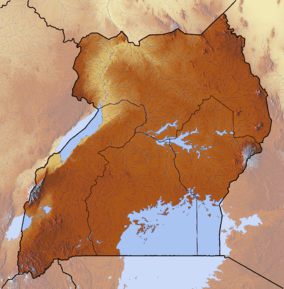Lake Mburo National Park
| Lake Mburo National Park | |
|---|---|
|
IUCN category II (national park) | |
|
The entrance sign to Lake Mburo National Park | |
 Location of Lake Mburo National Park | |
| Location |
Mbarara District, |
| Nearest city | Mbarara |
| Coordinates | 00°37′40″S 30°58′00″E / 0.62778°S 30.96667°ECoordinates: 00°37′40″S 30°58′00″E / 0.62778°S 30.96667°E |
| Area | 260 square kilometres (100 sq mi) |
| Governing body | Ugandan Wildlife Authority |
Lake Mburo National Park is a national park located in western Uganda.
Location
Lake Mburo National Park is located in Kiruhura District in Western Uganda. The park is situated about 30 kilometres (19 mi), by road, east of Mbarara, the largest city in the sub-region. This location is approximately 240 kilometres (150 mi), by road, west of Kampala, Uganda's capital and largest city. The coordinates of the park are:00 36S, 30 57E (Latitude:0.6000; Longitude:30.9500).[1]
Overview
The park has a variety of animals such as zebras, hippopotami, impala, warthogs, elands, buffaloes, jackals, leopards, and over three hundred (300) bird species. At 260 square kilometres (100 sq mi), the park is the smallest of Uganda’s Savannah national parks. The park has camp grounds and permanent tent facilities for visitors. Kimbla-Mantana African Safaris operate the only luxury tented camp inside the national park - Lake Mburo Tented Camp. In 2009, the Uganda Wildlife Authority, which manages the park announced plans to introduce balloon tourism in the park.[2]
History
Lake Mburo was originally gazetted in 1933 as a Controlled Hunting Area and upgraded to a Game Reserve in 1963. The Banyankole Bahima residents continued to graze their cattle in the Reserve until it was upgraded to National Park status in 1983. The Obote government's decision to upgrade the Park was reportedly in part intended to weaken the Banyankole, who supported anti-Obote rebels. It came at the time of the Operation Bonanza massacre of 300,000. As the evicted pastoralists were not compensated for lost grazing land or assisted with resettling, many remained hostile to the Park's formation. The rangeland outside the park was subsequently subdivided into small ranges and subsistence farming plots.[3]
In 1985 the second Obote regime fell and the previous residents of Lake Mburo re-occupied the Park's land, expelling park staff, destroying infrastructure and annihilating wildlife. Less than half of the Park's original land area was eventually re-gazetted by the NRM government in 1986.[3]
See also
References
- ↑ Location of Mburo National Park at Google Maps
- ↑ Lake Mburo National Park To Introduce Balloon Tourism
- 1 2 Mallarach, Josep-Maria (2008). Protected landscapes and cultural amb [i.e. and] spiritual values. Heidelberg: World Conservation Union. pp. 132–134. ISBN 3925064605.
Lion escapes from Lake Mburo national park, injures three people before being gunned down UWA Translocate 15 Giraffes to Lake Mburo National Park
External links
| Wikivoyage has a travel guide for Lake Mburo National Park. |